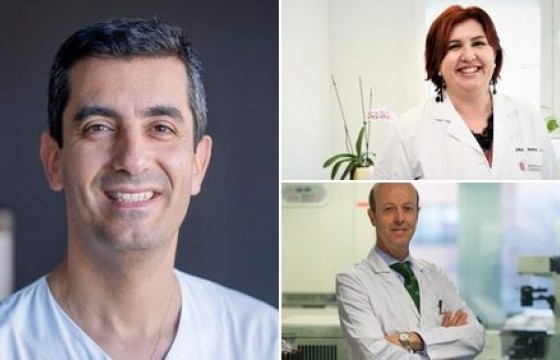
The Institute of Health Research of Navarra renews and reinforces its scientific management introducing it in Primary Health Care
Nicolás Martínez Velilla (HUN) takes over fromRosario Luquin in the position of scientific director in this new stage while Felipe Prósper (CUN) will be deputy director and Nuria Goñi (Osasunbidea/AP) completes the team as board member.
The Institute of Health Research of Navarra (IdiSNA) has renewed and reinforced its scientific management with a double change: the replacement of Rosario Luquín by Nicolás Martínez Velilla (HUN) and the creation of two new positions: that of deputy director -to be held by Felipe Prósper (CUN) - and that of board member, held by Nuria Goñi Ruiz (Osasunbidea/AP).
In this way, in addition to an original component of public-private collaboration, the vision of research in Primary Health Care is added at this first level of leadership as part of the start of a new stage in this institute formed by University Hospital of Navarra (HUN), the University of Navarra Clinic (CUN), the Public University of Navarra (UPNA), University of Navarra, Navarrabiomed, Cima University of Navarra, Institute of Public and Occupational Health and Primary Health Care of the Navarra Health Service - Osasunbidea.
The IdiSNA Board of Trustees addressed in its today's session the importance of disseminating this new trend in the scientific and healthcare community as the main reference in order to promote research in this new stage. The Minister of Health, Santos Induráin, who chairs the Board of Trustees, has recognized and thanked the involvement of the outgoing scientific director, Rosario Luquin (CUN), and highlighted the comprehensive vision of the new scientific structure and the curriculum of its three representatives who have already begun their work.
Nicolás Martínez Velilla is currently head of Geriatrics at the University Hospital of Navarra and an intensified researcher at Navarrabiomed-Miguel Servet Foundation since 2019. Graduated in Medicine and Surgery from the University of Navarra (1996) he completed his training as a specialist in Geriatrics in England, Madrid (University Hospital of Getafe) and Pamplona, since he received his doctorate at UPNA with a thesis on multimorbidity in the elderly, studies he completed in the field of Probability and Statistics (UNED) and Health services (University of Alcalá).
These are the fields in which he has deepened in his research activity –compatible with healthcare - since he has been a member of the Research Network in Health Services and Chronic Diseases REDISSEC of the Carlos III Health Institute (ISCIII) and later in the CIBER frailty and healthy aging network of this same institute.
In 2013 he created the Geriatrics Research Group of Navarrabiomed-Miguel Servet Foundation with an extensive number of publications. He is a visiting professor in the subject of Geriatrics at the Faculty of Medicine of the University of Navarra and associate professor at the Public University of Navarra in the area of Preventive Medicine.
He has been a representative of the Spanish Geriatrics Society in various state and international organizations. Since 2019 he has been a member of the Board of the European Academy of Geriatric Medicine and Vice-President of the Spanish Society of Geriatrics and Gerontology.
For his part, Felipe Prósper is a reference in Haematology since he co-directs the Haematology Department and leads the Cell Therapy Area of the Navarra University Clinic, a clinic he joined after a time at the Hospital Clínico de Valencia. He also directs the Haemato-Oncology and Regenerative Medicine Programs at the Cima University of Navarra. Graduated in Medicine and Surgery (1989) and doctor (1994) from that university, he completed his training with a postdoctoral stay at the University of Minnesota.
He is one of the promoters of the National Cellular Therapy Network (TerCel) of the ISCIII, as well as the RICORS TERAV. He is a member of the Cancer CIBER (CIBERONC) of the ISCIII, as the main researcher of one of its groups. Since 2015 he has been a Professor of Haematology at the University of Navarra, has been a member of the Board of Directors of the Spanish Society of Haematology and Haemotherapy (SEHH) and the Spanish Society of Gene and Cell Therapy (SETGYC), and formerly coordinator of the Oncology department of IdiSNA.
Finally, Nuria Goñi Ruiz (graduated in Medicine from the UN in 2001) comes from the area of Primary and Community Care of Navarra, work that she has combined with her research vocation since she received a doctorate at the University of Navarra in parallel with a long professional career of eleven years in various health centres.
Her professional profile also includes experience in management since 2016, carrying out technical tasks in the Support Service for Clinical Management and Continuity of Care of the Primary Health Care Management unit, carrying out technical support tasks for the Health Centres of Navarra of training and coordination with hospitals seeking the reinforcement of Primary Health Care.
In the field of Primary Health Care she has also worked on the implementation of different strategies of the Department of Health (Navarra Strategy for Integrated Care for chronic and multi-pathological patients) and application protocols in Primary Health Care, especially in relation to Frailty Care in the elderly. This has led her to participate in different multidisciplinary coordination groups and in several strategies. Since 2021 she has also been an associate professor in the area of Medicine at UPNA.
More than 1,000 researchers from 8 institutions
The purpose of the IdiSNA is to contribute to raising the quality of research, and, as a result of the biomedical care and teaching of the Foral Community of Navarra, as well as to optimize the existing human and material resources. To this end, synergies between clinical and basic groups will be promoted based on the models of already existing translational groups.
The research staff of IdiSNA in 2021 has 1,065 researchers, working in 96 research groups. These groups are allocated to nine research areas: Epidemiology and Public Health (EPSP); Primary Health Care, Health Services and Chronic Diseases (APSS); Mental Health (SMTAL); Digestive System and Metabolic Diseases (DEM); Inflammatory, Immune and Infectious Diseases (EIII); Neurosciences (NEUR); Onco-Haematology (OHEM); Cardiovascular and Renal Diseases (CVRDs); Advanced Therapies and Diagnostic Innovation (ATAID) and Bioengineering and Health Biotechnologies (BBS).
In the last year IdiSNA has been received a total of 61 research grants in competitive calls with a total funding of € 6,592,733. The total scientific output of the institute is around one thousand contributions annually.


